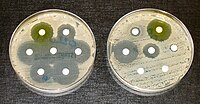
Photo from wikipedia
The aim of this study was to compare the antibiotic susceptibility of eighty Escherichia coli isolates from vegetables and food products of animal origin in Tunisia, and to study their… Click to show full abstract
The aim of this study was to compare the antibiotic susceptibility of eighty Escherichia coli isolates from vegetables and food products of animal origin in Tunisia, and to study their genes encoding antibiotic resistance and in vitro biofilm forming capacity. Antimicrobial susceptibilities were determined, as well as PCR investigation of genes associated with antibiotic resistance. Biofilm formation was tested using four different methods: the microtiter plate-, MTT-staining-, XTT-staining-, and the Congo Red Agar assays. High antibiotic resistance rates were observed for amoxicillin (68.7%), amoxicillin/clavulanic acid (73.7%), gentamicin (68.7%), kanamycin (66.2%), nalidixic acid (36.2%), streptomycin (68.7%) and tetracycline (35%). The majority of isolates was multidrug resistant and biofilm producer. MTT testing showed that vegetables isolates were significantly higher biofilm producers compared to foods of animal origins. This study showed that E. coli isolates from food products were reservoirs of genes encoding antibiotic-resistance and have a high propensity to produce biofilm.
Journal Title: International journal of environmental health research
Year Published: 2020
Link to full text (if available)
Share on Social Media: Sign Up to like & get
recommendations!